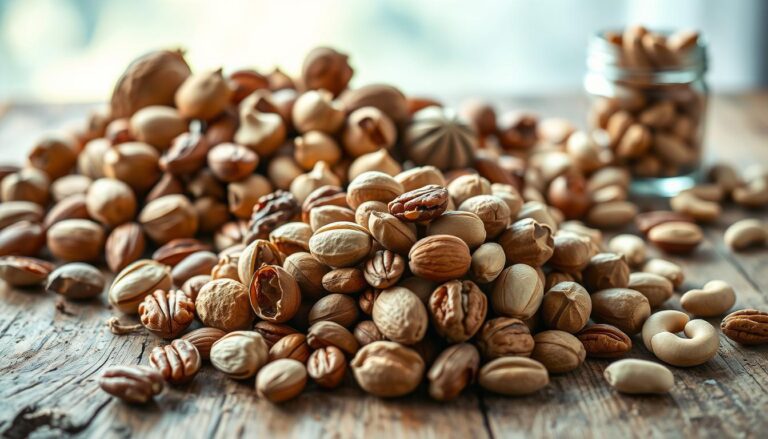Can a fruit known for its natural sweetness actually help with weight management? The answer lies in understanding the complex relationship between dates and their sugar content.
Dates are often misunderstood due to their high sugar content. However they are also rich in fiber vitamins, and minerals making them a nutritious addition to a balanced diet.
As we explore the impact of dates on health, we’ll examine the scientific evidence and discuss how they can be incorporated into a weight-conscious eating plan.
Key Takeaways
- Understanding the difference between natural and refined sugars
- The nutritional benefits of dates and their role in a balanced diet
- How dates can be incorporated into a weight-conscious eating plan
- The importance of moderation in consuming dates
- The potential health benefits of dates beyond weight management
Understanding Dates Nature’s Sweet Treat
The date palm tree, native to the Middle East and North Africa, produces a fruit that has been cherished for its taste and nutritional value. Dates have been a staple food in many cultures for thousands of years providing a natural source of sweetness and energy.
What Are Dates?
Dates are the fruit of the date palm tree (Phoenix dactylifera), cultivated for thousands of years in Middle Eastern and North African regions. They are known for their sweet caramel-like flavor profile and chewy texture when dried.
Almost all dates sold in Western countries are dried, with wrinkled skin indicating dryness, whereas smooth skin indicates freshness.
Types of Dates Medjool vs. Other Varieties
There are hundreds of varieties of dates, with Medjool dates being one of the most popular. Known as the fruit of kings Medjool dates are native to Morocco and are prized for their large size soft texture, and rich flavor.
In contrast other variety like Deglet Noor are smaller drier and less sweet. The choice of date often depends on the intended use in cooking and personal preference.
| Date Variety | Size | Texture | Taste |
|---|---|---|---|
| Medjool | Large | Soft | Rich, Sweet |
| Deglet Noor | Smaller | Drier | Less Sweet |
Nutritional Profile of Dates
Understanding the nutritional profile of dates is crucial for assessing their role in a healthy diet. Dates are known for their high energy density and natural sweetness, but they also offer a range of essential nutrients.
Calorie and Macronutrient Breakdown
A 3.5-ounce 100-gram serving of Medjool dates contains approximately 277 calories, primarily due to their high carbohydrate content. With 75 grams of carbs per 100 grams dates are rich in natural sugars like fructose glucose, and sucrose. The protein and fat content in dates is relatively minimal, contributing less to their overall nutritional profile.

Vitamins, Minerals, and Fiber Content
Dates are not just a source of calories; they are also rich in various micronutrients. They provide a good amount of potassium 15% DV magnesium 13% DV and copper 40% DV along with other minerals like manganese and iron.
Additionally, dates are a good source of vitamin B6 and contain about 7 grams of fiber per 100 grams, which contributes to their lower glycemic impact compared to refined sugars. As Dr. Emily Chen a nutrition expert notes, “Dates are a nutrient-dense food that can provide several health benefits when consumed in moderation.”
Dates are also high in antioxidants, including flavonoids, carotenoids, and phenolic acids, which may contribute to many of their health benefits. The fiber and antioxidant content in dates make them a valuable addition to a balanced diet, potentially supporting digestive health and reducing inflammation.
Sugar Dates & Weight Loss The Real Story
The relationship between sugar, dates, and weight loss is complex and often misunderstood. While dates are known for their natural sweetness, their impact on weight loss is not straightforward.
The Sugar Content in Dates
Dates contain natural sugars, primarily fructose, glucose, and sucrose. Unlike refined sugars these natural sugars are accompanied by fiber, vitamins, and minerals that provide nutritional value. The sugar composition in dates is different from that in processed foods, which can affect how the body processes them.
How Dates Affect Blood Sugar Levels
Despite their sweetness, dates have a moderate glycemic index GI ranging from 42 to 62 depending on the variety. This moderate GI rating means that dates have a less significant impact on blood sugar levels compared to foods with a high GI.
Research has shown that consuming moderate amounts of dates 3-4 per day does not significantly affect blood sugar levels in healthy individuals.
| Date Variety | Glycemic Index GI | Fiber Content g/100g |
|---|---|---|
| Medjool | 42 | 7 |
| Deglet Noor | 55 | 6.5 |
| Barhi | 62 | 6 |
The fiber content in dates helps slow down sugar absorption moderating the blood glucose response. This makes dates a relatively safe choice for those monitoring their blood sugar levels, provided they are consumed in moderation.
Dates and Weight Management Friend or Foe?
Understanding how dates impact weight requires examining their nutritional content and effects on the body. Dates are rich in fiber, natural sugars, and various nutrients, making them a complex food in the context of weight management.
Can Dates Support Weight Loss?
Dates may help support weight loss efforts due to their high fiber content, which promotes satiety and helps control appetite.
Research suggests that dates may inhibit pancreatic lipase, an enzyme involved in fat absorption, potentially supporting weight control. Replacing refined sugars and processed sweets with dates can also reduce overall calorie intake. Additionally dates provide sustained energy for physical activity due to their natural sugars and fiber content.
As Dr. John Smith a nutrition expert, notes Incorporating dates into a balanced diet can be a healthy choice for those managing their weight. The key is moderation and being mindful of portion sizes.
Potential Concerns for Weight Control
Despite their potential benefits, dates are calorie-dense, with approximately 277 calories per 100g.
Consuming dates excessively could contribute to weight gain. It’s essential to practice portion control when incorporating dates into a weight management plan. The timing of date consumption such as pre-workout or as a dessert substitute may also impact their effect on weight management.

To maximize the benefits of dates while minimizing potential drawbacks, it’s crucial to balance their consumption with other nutrient-dense foods as part of a comprehensive diet.
Health Benefits Beyond Weight Management
Dates are not just beneficial for weight management; they also offer other significant health advantages. Incorporating dates into your diet can provide a range of health benefits due to their rich nutritional profile.
Digestive Health and Fiber Benefits
Dates are an excellent source of dietary fiber, containing almost 7 grams per 3.5-ounce serving. This high fiber content supports digestive health by preventing constipation and promoting regular bowel movements. A healthy gut microbiome is also potentially benefited by the fiber in dates.
Heart Health Advantages
Research suggests that dates may have cardiovascular benefits, including reducing LDL cholesterol levels and improving lipid profiles. These effects could potentially lower the risk of heart disease. The fiber, potassium, and antioxidants in dates all contribute to their heart health advantages.
Brain Function and Cognitive Benefits
Dates may also support brain function and cognitive health. Laboratory studies have found that dates can help lower inflammatory markers associated with neurodegenerative diseases like Alzheimer’s. The antioxidants in dates play a crucial role in reducing inflammation and oxidative stress.
| Nutrient | Benefit |
|---|---|
| Fiber | Supports digestive health, prevents constipation |
| Antioxidants | Reduces inflammation, oxidative stress |
| Potassium | Contributes to heart health |
The diverse range of nutrients and antioxidants in dates makes them a valuable addition to a healthy diet, offering numerous benefits that support overall well-being.
Potential Downsides of Consuming Dates
Despite being a natural sweetener and nutrient-rich food, dates have several potential health risks associated with their consumption. While they can be a healthy addition to a balanced diet, it’s crucial to be aware of the potential downsides.

High Calorie Density Concerns
Dates are known for their high caloric density, with approximately 277 calories per 100g. Consuming them in excess can lead to a calorie surplus, potentially resulting in weight gain. It’s essential to practice portion control when enjoying dates as part of a weight management diet.
| Food Item | Calories per 100g |
|---|---|
| Dates | 277 |
| Other Dried Fruits | Varies (typically between 200-300) |
Considerations for People with Specific Health Conditions
Individuals with certain health conditions need to be cautious when consuming dates. For instance people with kidney disorders should be mindful of the high potassium content in dates as it may exacerbate their condition.
Similarly those with diabetes or insulin resistance should monitor their carbohydrate intake, considering the natural sugars present in dates.
It’s crucial for individuals with specific health conditions to consult their healthcare provider before making dates a regular part of their diet.
Other considerations include potential allergic reactions to dates or sulfites used in their processing, interactions with certain medications due to their high fiber and potassium content, and dental health concerns related to their sticky, sweet nature.
To enjoy dates while minimizing potential downsides, it’s recommended to consume them in moderation and be aware of individual health needs. By doing so, one can harness the nutritional benefits of dates while mitigating their potential negative impacts on health.
Dates vs. Other Sweeteners Making Comparisons
When it comes to sweetening foods, dates offer a nutritious alternative to refined sugar and other sweeteners. Unlike refined sugar dates provide additional nutritional benefits including fiber vitamins, minerals, and antioxidants.
Dates vs. Refined Sugar
Dates are a natural source of fructose, making them sweet and giving them a caramel-like taste. They can replace white sugar in recipes, especially when made into date paste. The glycemic impact of dates is moderate, with a GI of 42-62, compared to refined sugar’s high GI of 65-100. This difference is significant for blood sugar management.
Dates vs. Other Dried Fruits
Dates are often compared to other dried fruits like figs, raisins, and dried apricots. While all these fruits are natural sources of sugar, they vary in sugar content and fiber levels. For instance, dates contain about 65 grams of sugar and are rich in fiber, whereas figs have less sugar (about 16 grams) but also less fiber.
Understanding these differences is crucial for making informed choices about sweeteners and maintaining a balanced diet. Dates, with their nutrient-rich profile, offer a healthier alternative to refined sugar and can be a valuable addition to a healthy eating plan.
Smart Ways to Include Dates in Your Diet
Dates can be seamlessly integrated into your diet to boost energy and satisfaction. Incorporating dates into your daily meals and snacks can be both delicious and nutritious.
Healthy Portion Sizes
When adding dates to your diet, it’s essential to be mindful of portion sizes. Typically, 2-3 Medjool dates or 4-5 smaller varieties per day is a good guideline for those monitoring calorie intake or blood sugar levels.
Creative Recipe Ideas
Dates can be used in a variety of dishes, from breakfast to dessert. Some ideas include:
- Adding chopped dates to oatmeal or yogurt parfaits
- Mixing dates into savory dishes like stews or tagines
- Creating energy balls with dates, unsweetened coconut, and walnuts
- Making smoothies with dates, yogurt, and bananas
Using Dates as a Natural Sweetener
Dates can be pureed and used as a natural sweetener in baking and cooking. To make date paste, simply blend soaked dates with water until smooth. This paste can be used as a substitute for sugar in many recipes.
By incorporating dates into your diet in a balanced way, you can enjoy their nutritional benefits while maintaining a healthy and satisfying eating plan.
Conclusion Balancing Dates in a Healthy Diet
As we’ve explored, dates are a nutrient-rich food that can support overall health and well-being. They are an excellent source of essential nutrients, fiber, and antioxidants, providing numerous benefits when consumed in moderation.
Dates can be a great addition to a healthy diet, serving as a natural sweetener and satisfying sweet cravings in a more nutritious way than processed sweets. They also provide sustained energy through their fiber content.
To reap the benefits of dates, it’s recommended to consume 2-3 Medjool dates or 4-5 smaller varieties per day. This can help you obtain the nutritional benefits without excessive calorie intake, while also supporting overall health and dietary balance.





